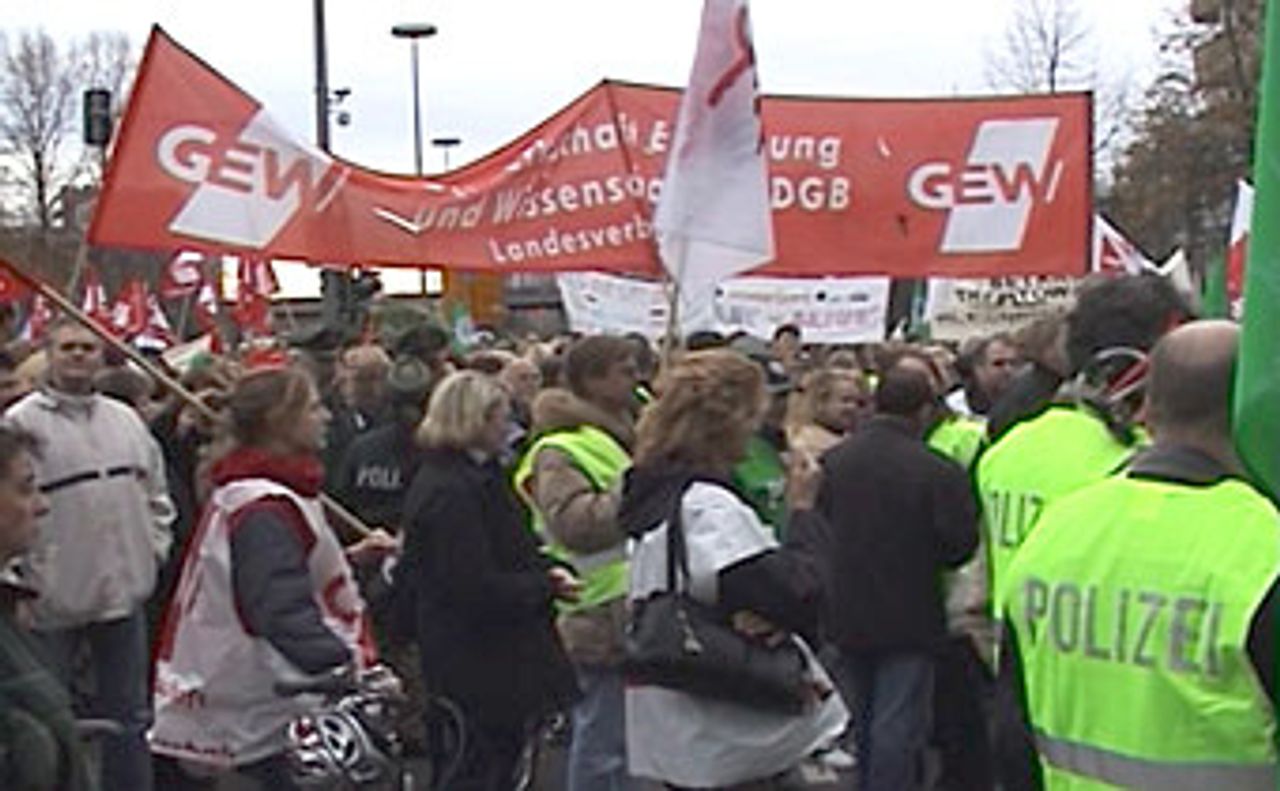Last Thursday, November 20, dozens of Berlin's teachers and education staff expressed their hostility to the policies employed by their union bureaucracy during the recent public service workers' wage dispute with the Berlin Senate.
 Along with the main public sector union Verdi, the teachers' trade union (the GEW) broke off a strike at the start of November after just two days and negotiated an abysmal contract with the city's Social Democratic (SPD)-Left Party coalition government. The contract involves a substantial loss in real wages for the city's 55,000-member teaching staff.
Along with the main public sector union Verdi, the teachers' trade union (the GEW) broke off a strike at the start of November after just two days and negotiated an abysmal contract with the city's Social Democratic (SPD)-Left Party coalition government. The contract involves a substantial loss in real wages for the city's 55,000-member teaching staff.
The trade unions had originally demanded a wage increase of 2.9 percent, beginning January 1, 2009, and three single payments of €300. Public sector workers in Berlin suffered a 10 percent cut in wages in 2003 and since then their incomes have stagnated. The 2003 wage cut was agreed to by the main public sector trade unions.
The latest contract negotiated by the unions has dropped the demand for a percentage increase entirely in favour of a single payment of €300 and an increase of €65, which is first due to come into effect in the summer of 2009. The contract as agreed represents a real wage cut when the average rate of inflation is taken into account. Many public service workers are also rightly sceptical that the €65 euro payment will ever come into effect at all, under conditions where the city's budget is being hard hit by the financial crisis.
The GEW had originally invited teachers to a meeting on Monday to discuss the contract. However, on short notice this meeting was called off and replaced with a joint meeting of teachers and other educational staff. The change was deliberate. Teachers organised in the GEW are generally younger and the aim of the union in including other educational staff in the meeting was to blunt the militancy of the teachers. In the event, the tactic backfired and the bureaucracy was confronted with considerable hostility from both young and older members of the union at the meeting.
At the start of the meeting, GEW contract negotiator Holger Dehring attempted to persuade the assembled membership that there was no alternative to the miserable deal accepted by the union leadership. Dehring had obvious difficulties in convincing his audience. He argued that the Senate was too rigid and stubborn and, in the final analysis, the membership was to blame. There was not enough support for the strike, Dehring claimed.
This assertion was immediately challenged by GEW members speaking from the floor, who accused the union leadership of undermining the militancy of teachers. One speaker declared, "We had a good strike meeting, we wanted to hold out longer. We wanted to carry out a demonstration jointly with teachers, educational staff, pupils and parents. We made this clear to the GEW, but they did nothing. You cannot tell me now that all means were exhausted. That was by no means all we could have done."
His remarks were supported by an older teacher, who stated, "I am really ashamed that we carried out action for such a long time and ended up with such a bad deal."
Thomas is a teacher at the French High School in Berlin. He told the WSWS that the original 2.9 percent demand raised by the union was much too small. He was opposed to the way in which the trade unions continually submit to the dictates of the leading political parties.
Other members at the meeting expressed their anger with the deal agreed to by the union. One teacher reported that the caretaker at her school had resigned from Verdi following the union's agreement to the contract. She said, "I have just read in the newspaper that Berlin has a budget surplus of $600 million. And in this situation we are told we should be content with €7 million!
"I have worked it out: if we had not taken strike action then I would be €11 per month better off in the coming year. Following the contract, I have an additional €15, in other words, an additional €4. If one takes into account my loss of income due to the strike, then at the end of 2009 I am worse off."
Another young teacher told the WSWS, "Four weeks ago the GEW told us at a meeting that we should be glad we can go on strike as opposed to older colleagues, who are officially employed as civil servants and are not allowed to strike. Now we have a lousy contract, which forbids us from taking strike action until December 31, 2009. This cannot be true."
Teachers will be voting on the deal in the coming days. Representatives of the WSWS are distributed leaflets calling upon teachers to vote down the contract as part of a struggle to politically break from the trade union bureaucracies and develop a political movement against the Social Democratic-Left Party Senate.
Subscribe to the IWA-RFC Newsletter
Get email updates on workers’ struggles and a global perspective from the International Workers Alliance of Rank-and-File Committees.
